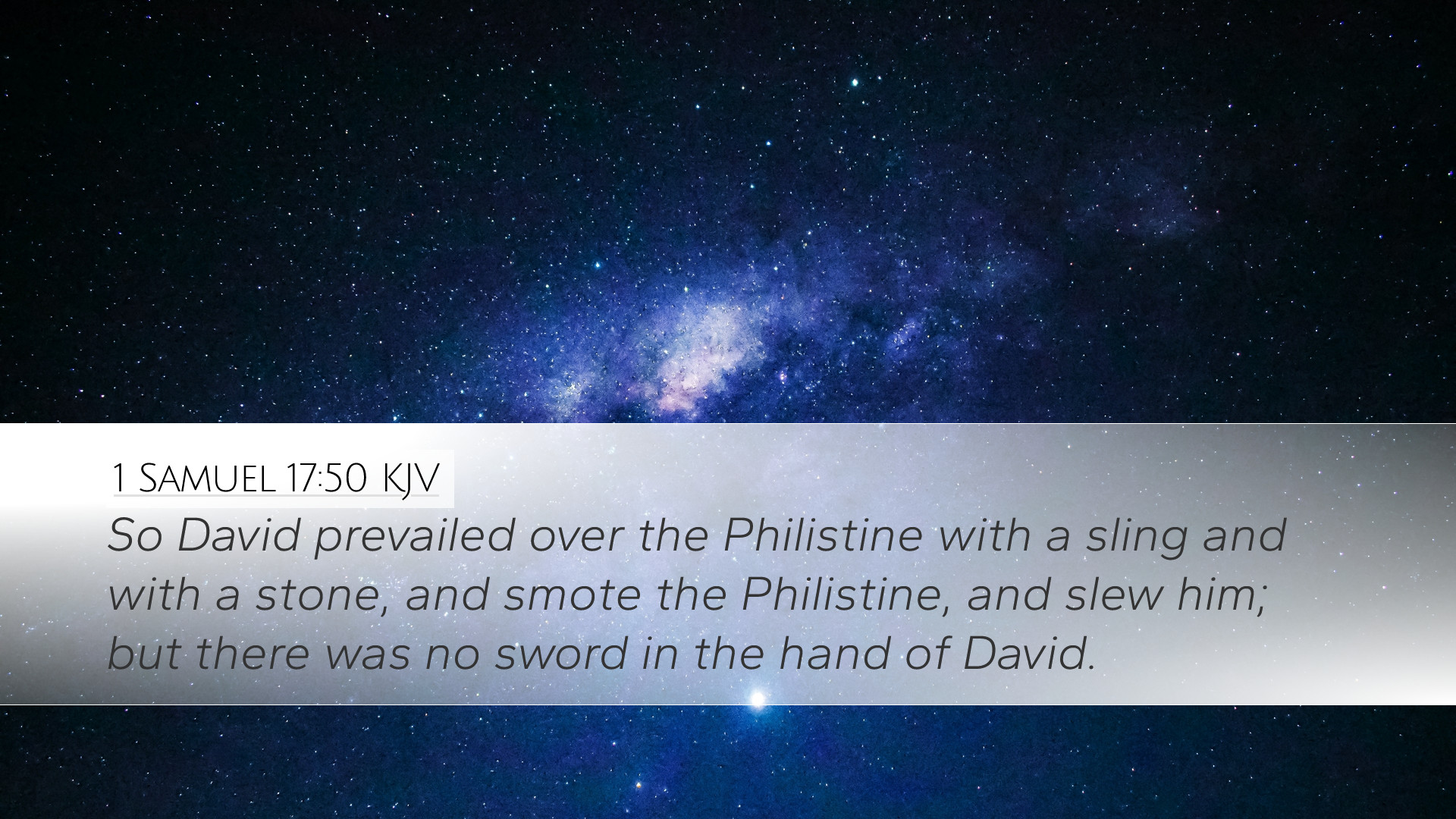Commentary on 1 Samuel 17:50
Verse Text: "So David prevailed over the Philistine with a sling and with a stone, and struck the Philistine and killed him. There was no sword in the hand of David."
Introduction: The narrative of David and Goliath is one of the most well-known stories in the Bible, demonstrating faith, courage, and God's providence. 1 Samuel 17:50 stands as a climactic moment in this account, highlighting the victory of David—a young shepherd over a seasoned warrior. This commentary draws on insights from Matthew Henry, Albert Barnes, and Adam Clarke to provide a deeper understanding of this pivotal verse.
Contextual Background
The battle between the Israelites and the Philistines is set in the valley of Elah. Goliath, the giant, challenged Israel daily, instilling fear among Saul’s army. David, sent by his father to deliver provisions to his brothers, witnessed Goliath's taunts and offered to fight him. David’s selection as a champion is crucial as it illustrates God's sovereign choice and the faith of a seemingly insignificant individual being raised to accomplish great things.
Analysis of the Verse
David's Victory
Matthew Henry points out that David's victory is attributed not to conventional warfare but to his faith in God. David's confidence and previous experiences of delivering sheep from lions and bears equipped him with a profound trust in God's ability to deliver him from Goliath. This emphasizes the principle that victory often comes through faith and reliance on divine strength rather than human might.
The Means of Victory
According to Albert Barnes, the choice of defeat weapons—a sling and a stone—serves to highlight the irony of the situation. David, who possessed no sword, defeated a heavily armed giant by the means that seemed most unlikely. This illustrates the biblical principle that “God's strength is made perfect in weakness” (2 Corinthians 12:9). Barnes emphasizes that David's success demonstrated God's power operating through humble means.
The Nature of Deliverance
Adam Clarke elaborates on the nature of deliverance in the victory over Goliath. He suggests that David’s triumph not only secured physical salvation for Israel but also represented a psychological victory over fear. David's faith catalyzed a transformation within the Israelite army, moving them from a state of terror to one of renewed courage. Clarke connects this to the broader theme of God's redemptive work throughout scripture, where God's chosen instruments often appear weak or insignificant but achieve great victories through divine enablement.
Theological Implications
This verse presents several theological implications relevant to pastors, theologians, and scholars:
- Faith in Action: The account highlights the necessity of faith actively demonstrated. David's willingness to confront Goliath illustrates that faith requires action, as he did not wait for others to act but stepped forward himself.
- God's Sovereignty: There is a clear indication of God's hand in David's victory. The absence of a sword signifies that God’s purposes are not limited by human resources; He is able to deliver His people by any means He chooses.
- Symbolism of the Stone: The stone, as a small yet deadly projectile, may symbolize the Gospel message—seemingly weak in the eyes of the world but potent for salvation. This reflection invites deeper contemplation on the means God uses to achieve His purposes.
Practical Applications
The insights drawn from David’s encounter with Goliath hold numerous practical applications for contemporary life:
- Courageous Leadership: Leaders are called to demonstrate courage in the face of challenges, mirroring David’s resolve. This serves as a reminder that effective leadership arises from faith and obedience to God.
- Overcoming Fear: Just as David overcame fear through faith, individuals today are encouraged to confront their own giants—be it personal struggles, societal issues, or spiritual battles—with confidence in God’s power.
- Dependence on God: The narrative invites believers to assess their dependence on God rather than solely on their resources. Like David, one should rely on spiritual weapons (faith, prayer, and God’s Word) rather than earthly means.
Conclusion
1 Samuel 17:50 encapsulates the dramatic and theological significance of David’s victory over Goliath. This verse serves as a resounding reminder of God's ability to use the humble and the unlikely to achieve His purposes. For scholars, pastors, and believers, it reinforces the critical nature of faith and the profound truth that God can turn our weaknesses into strengths, empowering us to face even the most daunting challenges with confidence.


